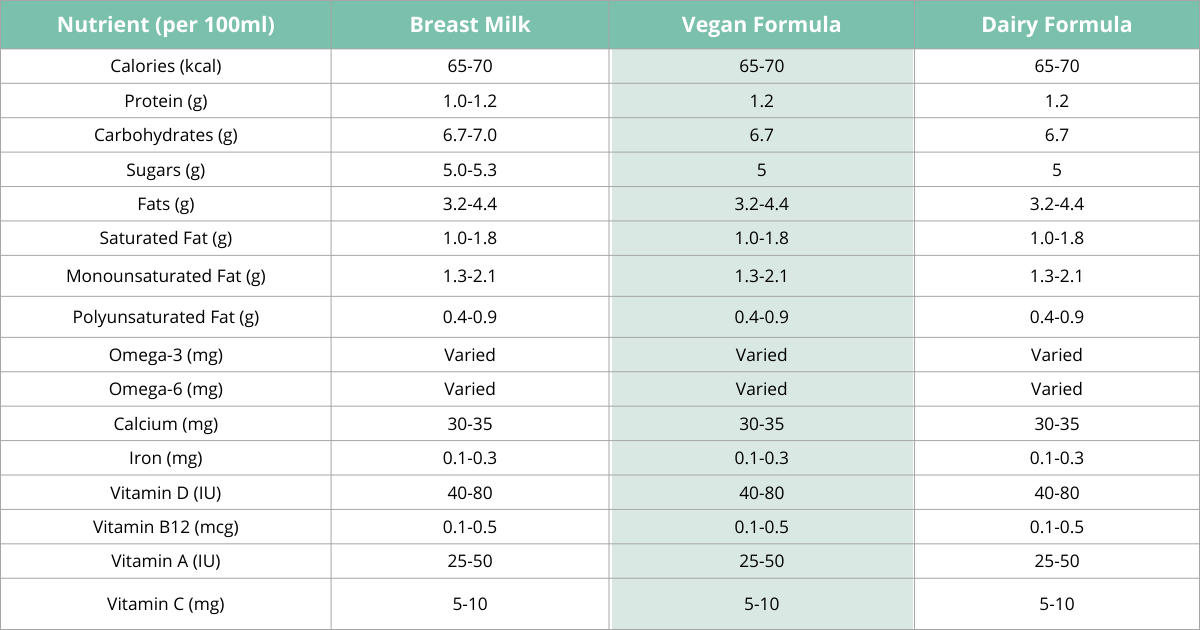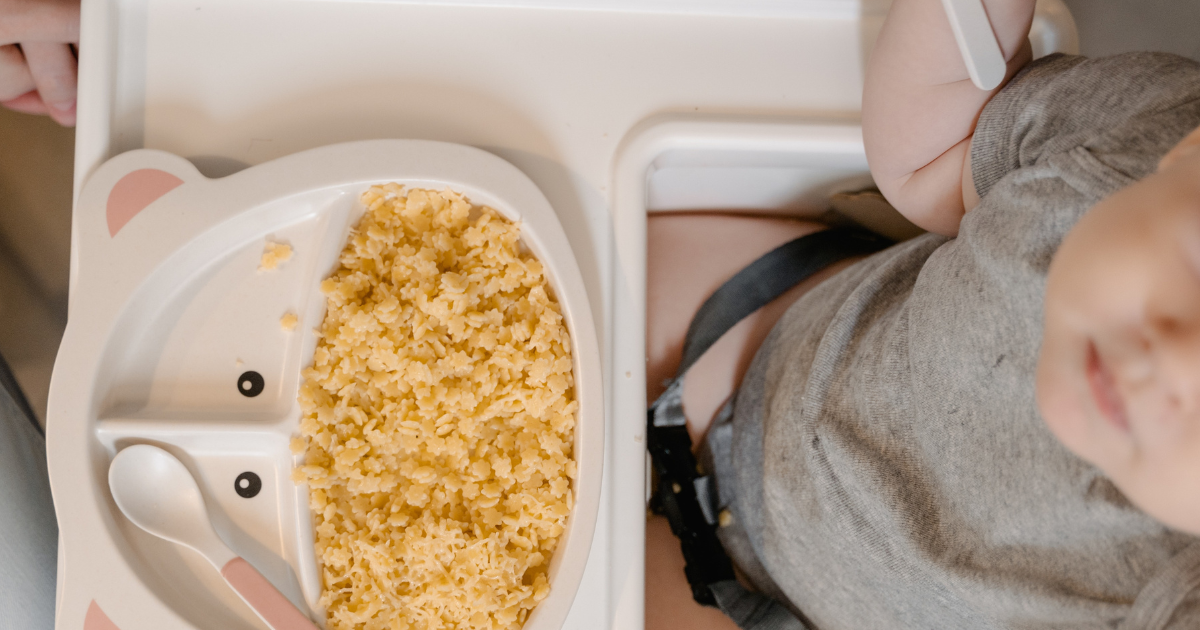I understand the importance of providing the best nutrition for our little ones. In this article, I will delve into vegan baby formula, exploring its benefits, considerations, and providing valuable suggestions for parents seeking a plant-based alternative. Let’s discover the wonders of vegan baby formula together!
What is Vegan Baby Formula?
Vegan baby formula is a specialized alternative to traditional dairy-based formulas. It is specifically designed to provide essential nutrients for infants while adhering to vegan principles. Vegan baby formula is free from animal-derived ingredients, such as cow’s milk or lactose, and instead, it utilizes plant-based sources to meet the nutritional needs of growing babies.
The Benefits of Vegan Baby Formula
1. Optimal Nutrition: Vegan baby formula is fortified with essential nutrients, including vitamins, minerals, and fatty acids, to support a baby’s growth and development.
2. Allergy-Friendly: Being free from common allergens, such as dairy and lactose, vegan baby formula offers a suitable option for infants with allergies or sensitivities.
3. Environmental Considerations: By choosing vegan baby formula, parents contribute to reducing their carbon footprint and promoting sustainability.
Choosing the Right Vegan Baby Formula
When selecting a vegan baby formula, it’s important to consider a few key factors. Look for formulas that are certified vegan and ensure they meet the necessary nutritional standards for infants. Comparing different brands and examining their ingredient profiles can help you make an informed decision that suits your baby’s needs.
Navigating the Journey of Weaning:

When and How to Transition from Breast Milk
The age at which a child is weaned off breast milk can vary based on individual circumstances and preferences. The World Health Organization (WHO) recommends exclusive breastfeeding for the first six months of a baby’s life. After six months, complementary foods can be introduced while continuing breastfeeding up to two years of age or beyond.
Ultimately, the decision to wean a child off breast milk depends on factors such as the mother’s and baby’s comfort, nutritional needs, and readiness for solid foods. Some mothers may choose to gradually introduce formula or other milk alternatives as they introduce solid foods, while others might continue breastfeeding for an extended period.
It’s important to consult with your pediatrician or a healthcare professional to determine the best approach for weaning based on your child’s individual needs and development.
Breast Milk vs Vegan vs Dairy Formula
The below Table is a comparison of the nutritional values for breast milk, vegan, plant-based, and dairy formulas. Values may vary between different brands and formulations. Please use these as general guidelines only:

Please note that breast milk provides a range for some nutrients as its composition can vary based on factors such as the mother’s diet and stage of lactation. Additionally, the values for vegan, plant-based, and dairy formulas are approximate and can vary between different brands and formulations. Always consult the product labels and your pediatrician for accurate and specific nutritional information for the formula you choose.
Preparation and Feeding Guidelines
Preparation requires careful attention to ensure proper nutrition and hygiene. Follow the instructions provided by the formula manufacturer precisely, and always use clean utensils and sterilized bottles. It is essential to measure the formula accurately and pay attention to water temperature for safe and effective preparation. Common question asked is
Can Babies Drink Cold Formula. Ensure you transition you baby comfortably from breast milk at the right temperature.
Addressing Common Concerns and Misconceptions
As with any specialized dietary choice, there are often misconceptions and concerns. Let’s address some common ones:
1. Protein Adequacy: Vegan baby formulas are formulated to provide sufficient protein for infants. They often use plant-based protein sources such as soy protein, pea protein, or rice protein, which can meet the protein needs of growing babies.
2. Nutrient Deficiencies: Vegan baby formulas are fortified with essential nutrients to ensure proper growth and development. They contain key vitamins and minerals like calcium, iron, vitamin D, and omega-3 fatty acids, which are crucial for a baby’s health.
3. Digestibility: Vegan baby formulas are designed to be easily digestible for infants. They are formulated to mimic the composition of breast milk and provide gentle nourishment for delicate digestive systems.
4. Growth and Development: Numerous studies have shown that infants fed with vegan baby formula can achieve normal growth and development milestones. However, it’s important to monitor your baby’s growth and consult with a pediatrician to ensure they are thriving.
Consulting with a Pediatrician
Before making any significant dietary changes for your baby, it is crucial to consult with a pediatrician. They can assess your baby’s specific needs, provide personalized advice, and monitor their growth and development to ensure they are receiving optimal nutrition.
Transitioning from Vegan Baby Formula to Solid Foods

As your baby grows, their nutritional needs change. It is important to introduce solid foods gradually and in consultation with a pediatrician. They can guide you on appropriate food choices, textures, and timing for a smooth transition from formula to solid foods.
Support and Community Resources
Parenting can sometimes feel overwhelming, especially when choosing a specialized feeding option like vegan baby formula. Fortunately, there are supportive communities and resources available to provide guidance and connect you with like-minded parents. Online forums, social media groups, and local parenting networks can offer valuable support and information.
Conclusion
Choosing vegan baby formula is a personal decision that requires careful consideration and consultation with healthcare professionals. With the right choice of formula, proper preparation, and support from a pediatrician, parents can confidently provide their babies with a nutritionally balanced, plant-based alternative. Remember, every baby is unique, and what works for one may not work for another. Trust your instincts, seek professional advice, and embrace the journey of nurturing your vegan baby with love and care.
FAQs
1. Is vegan baby formula suitable for all infants?
It is suitable for most infants, but it’s important to consult with a pediatrician to ensure it meets your baby’s specific nutritional needs.
2. Can vegan baby formula provide all the necessary nutrients for my baby’s growth?
Yes, they are fortified with essential nutrients to support your baby’s growth and development. However, it’s crucial to choose a formula that meets nutritional standards and consult with a healthcare professional.
3. Are there any side effects of using vegan baby formula?
It is generally well-tolerated, but every baby is unique. Some infants may have specific sensitivities or allergies, so it’s important to monitor your baby’s response and consult with a pediatrician if you have any concerns.
4. Can I breastfeed and use vegan baby formula simultaneously?
It is possible to combine breastfeeding with vegan baby formula. However, it’s recommended to discuss this with a healthcare professional to ensure your baby’s nutritional needs are adequately met.
5. How can I ensure my baby is getting enough nutrients on a vegan diet?
A well-planned vegan diet can provide all the necessary nutrients for infants. It’s important to include a variety of plant-based foods, consult with a pediatrician, and consider appropriate supplementation if needed.
*We may earn a commission from purchases made through our links, at no cost to you. This does not affect our product recommendations. Please see our disclosure to learn more.







